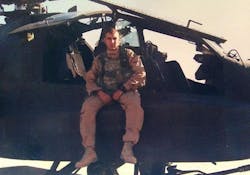Veteran spotlight: Bridgestone Off-the-Road President Rob Seibert
Veterans are all about service, which is one of the many reasons they thrive in the commercial vehicle service and repair sector. In this new Fleet Maintenance series, we will be highlighting the men and women who chose at one time to serve their country, and continue to serve by ensuring the nation's commercial vehicle operators can execute their mission.
We also hope this will shed light on the overall benefits that vets provide, from productivity to reliability. And, oh, the stories they tell...
Rob Seibert | Captain | U.S. Army
President, Off the Road, North America | Bridgestone Americas
In the fall of 2001, Rob Seibert had just started his final year at the University of Tennessee at Martin. The ROTC cadet already knew his future would be decided by the U.S. Army and had been through airborne school, but when the planes hit on Sept. 11, he knew his tenure would be vastly different than what he expected.
He wanted to be a pilot, and his test scores and abilities positioned him for one of the most challenging jobs the Army offers: Apache helicopter pilot.
“That's one of the most task-saturated aircraft in the world—because you're not just trying to fly an aircraft in general; you're also flying low the ground,” Seibert said. “And then on top of that, you're not just going from point A to point B—obviously, the Apache has got Hellfire missiles and other armaments there.”
These combat pilots fly towards the fight. During eight years as a commissioned officer, Capt. Seibert served two tours supporting Operation Iraqi Freedom.
Even those who haven’t served can likely imagine what Seibert’s flight time entailed, but he said most people don’t understand how critical maintenance and logistics are to the mission.
Read more: Leadership lessons from trucking’s military veterans
“A lot of people would say the U.S. military is a maintenance organization first and a warfighting organization somewhat second because without that, nothing moves,” Seibert quipped.
He said the first questions his superiors asked him daily concerned the aircraft’s uptime and maintenance status. The Army taught him preventive and proactive maintenance could be the difference between life and death.
“Your operational readiness is absolutely the most important thing that you deliver as a leader,” he said, adding that solving supply chain issues was also vital to completing the mission.
Seibert’s experience in extreme conditions not only prepared him to become the leader he is today, but also helps him better relate to Bridgestone’s mining and quarry customers, who may face similar environments (though thankfully not saturated with enemy forces).
Seibert also participates in the Bridgestone Americas Veterans Organization (BRAVO) employee resource group. He stressed that with many leaving the service following two decades of wars, “we need to find ways to give these veterans opportunities.
Before Veterans Day this year, the group invited a Wounded Warrior Foundation speaker to talk about post-traumatic stress disorder (PTSD) and losing his leg. While one injury is far easier to notice, both can impact a veteran’s life. Seibert offered that a leader’s job is to “be cognizant of and aware of” their employees’ unseen mental health issues like PTSD, veteran or not.
When hiring a veteran, the executive recommended not getting too intrusive into a vet’s service history.
“You don't want to automatically assume or put somebody in a position of defense by asking them too many questions,” he said.
You should, however, ask any vets in the company for help in vetting vets.
“It's very rare for an organization to not have a veteran inside there,” Seibert said. “So maybe reach out to them and ask for support internally. Don't try to do it all on your own.”
If you know a veteran working in the commercial vehicle industry who should be profiled in a future piece, email us at [email protected].

